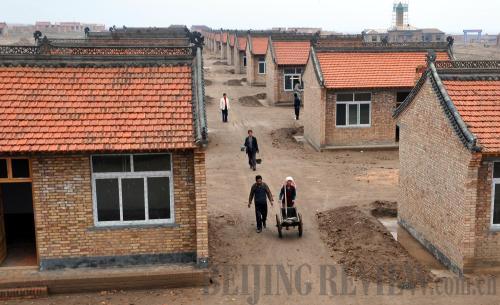|
 |
|
FARM HOUSES MATTER, TOO: The rural population is also entitled to comfortable new housing (LIU QUANLONG) |
Events and Economics
Some small and medium-sized cities across China have reportedly been trying desperately to host national or international sports competitions. Authorities of these cities believe holding a sports event would raise their image and attract investment.
But the fact is it's hard for a city to attract investment and boost its economic growth by trying to gain fame through sports events. A city has also to improve administration and infrastructure to become an attractive investment destination.
Most cities overstress the benefits of hosting a sports event and tend to overlook negative effects. In reality, hosting top-level sports events is a great challenge for a city because it has to upgrade its services, improve its infrastructure, strengthen security systems and raise the level of enthusiasm among its people.
Where will officials of a city with a small population get enough people to fill a giant stadium even for a big sports event? This shows why small cities are not suited to playing host to big sport competitions.
Besides, instead of getting the publicity they expected, many cities impose a heavy burden on local public funds. And even in affluent cities, every empty gymnasium or stadium is nothing more than a colossal waste of money.
The Beijing News
A Dream or Reality?
According to the Policy Research Center of the Ministry of Housing and Urban-Rural Development, nearly 70 percent of Chinese families will be living in newly built houses over the next 10 years.
From 1999 to 2008, more than 80 million square meters of commercial housing were built, and 70 million families, accounting for 30 to 35 percent of all Chinese households, bought new houses. In the next 10 years, another 70 million to 80 million new houses will be built. Consequently, added to the former 30 to 35 percent, the total proportion will approach 70 percent.
But if these figures totally ignore the rural population and housing construction in the countryside, how could the ministry draw such a conclusion? It's ridiculous to exclude farmers and rural areas when estimating the overall situation.
Besides, the calculation is illogical. Market-oriented reform of the housing system began in 1999, so some officials define all houses built after 1999 as "new houses." But ordinary people do not take the change of a policy as a criterion to distinguish between new houses and old houses. It's a pity that some officials confuse simple concepts.
Changjiang Daily
A Bloody Honor
Although people have not yet recovered from the tragedy of the Xinxing coal mine blast, which caused 108 deaths in Heilongjiang Province last month, it was revealed at a recent national conference that China's mine disaster rescue capacity has reached the international advanced level, with a success rate of 98 percent.
If this high rate points to the safety level in mines' working conditions, we should give it a "hooray." This rate, however, is based on frequently occurring mine disasters and unsafe underground working conditions. This is a high rescue success rate based on a high death toll.
We would rather not see this international advanced level, as we do not want to see frequent coal mine disasters, especially fatal accidents like the one in the Xinxing mine.
The so-called "mine disaster rescuing success rate" is nothing to be shown off but only a "negative achievement." It is actually a reflection of the poor working conditions and safety levels Chinese miners are faced with and it is always accompanied by terrible disasters. For such a "success rate," we would rather not have the honor.
Qilu Evening News
Stressed at Work
In this year's job market, college graduates must meet a new requirement—that is, the ability to withstand being stressed on the job. Sometimes, it implies: Working for this company, you have to be able to face huge pressure; if you cannot, please don't apply. Of course, you cannot expect high wages.
For employees, what matters most is personal ability and the expected payment, while for employers it is—what kind of staff I need and what working conditions I can offer them. But strangely, employers have begun to demand job hunters who have the ability to withstand stress. This ability is not a special work skill. Why is it put forward as a compulsory requirement?
Some employers complain that young job hunters are mollycoddled and are unable to work under any pressure. It's true that some of them are, but most are not. They are paid little, live in bad conditions, have no money to get married and so on.
The job market is becoming a "slaughterhouse" for new college graduates. Instead of providing jobs with proper treatment attached to them, employers are demanding the ability to withstand stress in a cruel and tough working environment.
Yangcheng Evening News | 